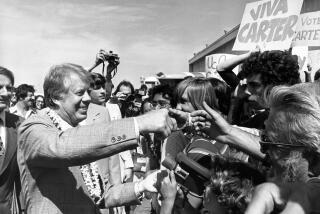Campaign ’96 / REPUBLICANS : Forbes Borrows From a Historic Playbook : Like the wealthy publisher, Wendell Willkie was a rich businessman new to politics. They share many of the same traits but only one has tasted defeat.
- Share via
WASHINGTON — He was an outsider, a wealthy businessman who had never before held or even sought elective office. Yet when he plunged into the race for the Republican presidential nomination, aided by a massive media blitz, he threw the established contenders into disarray and fired the imagination of the public.
It sounds like the story of Steve Forbes’ 1996 candidacy. But this script was first written more than half a century ago by Wendell Willkie, the dark horse who became the GOP’s standard-bearer against Franklin D. Roosevelt in 1940.
The parallels are certainly not lost on Forbes, whose father, Malcolm Forbes Sr., counted Willkie as one of his heroes. Last spring, when Forbes was deliberating whether to run, political consultant and longtime associate Jude Wanniski borrowed the Willkie biography “Dark Horse” from the library and persuaded Forbes to read it.
Forbes had been telling his supporters that the sort of underdog effort he was being urged to make had never been done before. Wanniski used the book to refute that argument.
“I wanted to show him that it had been done before,” Wanniski said. To Forbes, Wanniski said, Willkie’s story “was evidence that a guy with the right ideas could sell himself to the voters.”
Indeed Forbes thought enough of the book, originally published in 1984, to review it favorably in his magazine last June. “He was advertising his candidacy,” Wanniski says.
Willkie’s example is not a completely positive one. After all, Roosevelt clobbered him in the general election. Yet Forbes, as much an ingrained optimist as Willkie himself, managed to find a silver lining in the outsider’s defeat. “Willkie pulled more votes than any previous GOP candidate,” he wrote in his review, “a record which wasn’t broken until Ike ran 12 years later.”
Aside from their outsider status, Willkie biographer Steve Neal sees several other similarities between Forbes and Willkie. For one thing, he pointed out, “both had messages of economic growth.”
While for Forbes that message has found its primary vehicle in his controversial flat-tax plan, Willkie made his mark in public life as a forceful critic of the economic policies of the New Deal. As president of Commonwealth & Southern, a big power company, Willkie’s particular target was regulation of utilities and the New Deal’s efforts to supplant private power companies with the publicly owned Tennessee Valley Authority.
Though Willkie lost his battle against TVA in the courts, his efforts put him on the cover of Time magazine, which referred to him “as the only businessman in the U.S. who is ever mentioned as a presidential possibility.”
By 1940, as the GOP nominating campaign heated up, another factor that helped Willkie, as it seems to be aiding Forbes, was the sense among many Republicans of a leadership vacuum in their party.
Just as the current front-runner Bob Dole is not seen as an inspiring figure, neither was the 1940 leader in the polls, Thomas E. Dewey of New York.
The war abroad and the threat to U.S. security provided a sense of urgency and need to depart from the status quo, comparable to today’s pervasive discontent with both political parties and the performance of the principal institutions of government.
In the crisis environment of 1940, Willkie’s unorthodoxy, including his strong advocacy of aid to beleaguered Britain in contrast to the isolationism prevailing among most other GOP leaders, served him well.
Another factor in common between the two men is the boost their candidacies have received from the media. In Willkie’s day, television did not exist as a tool, and even radio commercials were unheard of.
But Willkie got plenty of help from the dominant media of his day, national magazines--notably Henry Luce’s Time, Life and Fortune; Look, published by the Cowles family, and the Saturday Evening Post--and such influential newspapers as the New York Herald Tribune. These lords of the press, initially attracted to Willkie by his challenge to New Deal economic policies, were further enamored by his internationalism, which reflected their own views.
Willkie’s media backers often cast journalistic objectivity to the winds in their efforts to aid their candidate. In an 11-page article in May, the month before the Republican convention in Philadelphia, Life hailed him as “by far the ablest man the Republicans could nominate.” And in its June 10 issue, Time said that while Dewey “was fumbling with the topic of foreign affairs, and [Ohio Sen. Robert] Taft appeared to be running toward the wrong goal posts, Willkie seized the ball.”
One distinction between the two men, according to Richard Norton Smith, biographer of Thomas E. Dewey, is that “Willkie’s appeal was more personal.” In contrast to Forbes, with his thick-lensed glasses and stilted diction, Willkie’s appearance and manner generated magnetism.
But the two men have at least one trait in common: self-assurance. Just as Forbes’ implacable commitment to his flat-tax idea and his disregard of what he regards as extraneous issues seems to intimidate journalists, Willkie’s faith in himself shielded him against criticism. “I’m the cockiest fellow you ever saw,” he declared at one rally. “If you want to vote for me, fine. If you don’t, go jump in the lake.”
And like Forbes, Willkie refused to apologize for his business background. “I’m in business and proud of it,” he declared. “Nobody can make me soft-pedal any fact in my business career. After all, business is our way of life, our achievement, our glory.”
More to Read
Sign up for our Book Club newsletter
Get the latest news, events and more from the Los Angeles Times Book Club, and help us get L.A. reading and talking.
You may occasionally receive promotional content from the Los Angeles Times.









